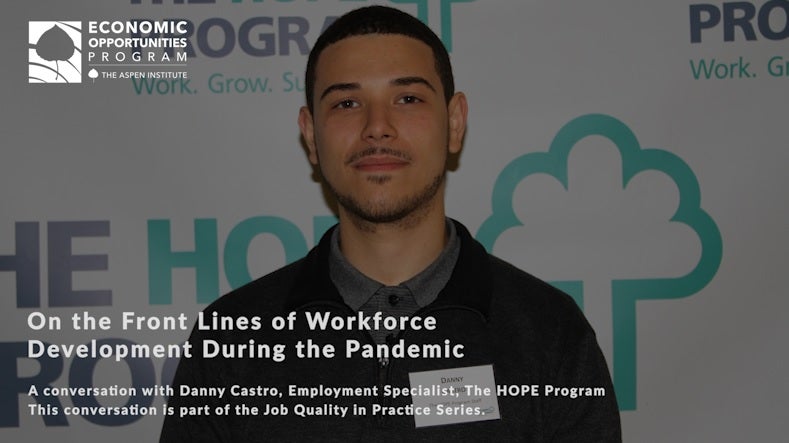How the Workforce System Can Advance Workplace Health and Safety During and After the Pandemic
Description
Across the nation, workforce development professionals are making efforts to help workers connect to jobs and provide for their families amidst concerns about workplace health and safety during the pandemic. And the risks to health and safety are not distributed equally. Due to occupational segregation and other factors rooted in structural racism, Black, Indigenous, and people of color are more likely to endure severe health consequences from the virus and to be concentrated in frontline jobs with high levels of exposure.
In this webinar, panelists share about the crucial role workforce development professionals can play in advancing workplace health and safety, including through direct engagement with employers and partnerships with local advocacy organizations. Panelists also discuss how these strategies can be applied to other job quality areas and ways public and philanthropic funders can support this critical work.
Speakers

Hugo Avila
Coordinator of Business Services, SERCO
Hugo Avila began his career in print publication developing advertisements, performing copy writing, and graphic design work. As the demand for print media diminished, his customer service and sales background provided him with a path to new opportunities, leading to his current career in social services in the field of workforce development. He holds a bachelor’s degree in advertising, a certification of completion from the Job Developer Track offered by the Chicago Jobs Council, and a certification from the board of Certified Workforce Development Professional. He is currently enrolled in Morton College and in the process of obtaining a degree in business management and a certification in business management. He is partnered and is a member of several chambers of commerce and employer organizations, such as the Berwyn Development Corporation, West Suburban Chamber of Commerce & Industry, and Alliance Manufacturing of Illinois. He has been in workforce development for over six years, with a prior 10 years in customer service and sales, along with four years in management and eight years in business-to-business employer outreach.

Christopher Dews
Policy Advocate, Job Opportunities Task Force @jotfmaryland
Christopher Dews is a professional actor, speaker, educator, theologian, and political activist currently living in Baltimore City. He works as a policy advocate for the Job Opportunities Task Force, where he lobbies for policies that promote better jobs, skills training, and wages for low-income workers and job seekers in Maryland. Current policy efforts include expanding sick and safe leave access to all workers, reforming the cash bail system, reducing auto-insurance rates for indigent communities, ensuring voting rights for eligible detainees and misdemeanants, criminal record expungement, and the decriminalization of poverty throughout Maryland. Before his political activism, Christopher spent years transitioning formerly incarcerated Baltimore City residents into full-time environmental construction positions such as solar panel installation. It was this work that truly exposed him to the debilitating barriers that hinder lower-income communities from advancing into safe and sustainable lives. Christopher has always had a passion for empowering the disenfranchised and views influencing legislation as the most effective way to accomplish this mission.

Clair Minson @ClairMinson
Founder and Principal Consultant, Sandra Grace LLC
Clair has ten years of experience in the non-profit sector, specifically in workforce development and mental health counseling. Since 2017, Clair has focused on the intersection of racial equity and workforce development, examining the manifestations of systemic and institutional racism in workforce policies, practices, and messaging. She has a Bachelor of Arts in psychology from Clark Atlanta University and a master’s degree in Community Counseling from Argosy University. She is a nationally certified counselor and a licensed clinical professional counselor in the state of Maryland.
In her most recent role, Clair served as the assistant vice president of talent development at the New Orleans Business Alliance, where she was responsible for developing and leading the implementation of the talent and workforce development strategy with the use of a racial equity lens in partnership with the city’s Office of Workforce Development. Currently, Clair serves as the principal consultant for Sandra Grace, LLC, a counseling and consulting firm committed to providing consulting and thought partnership to non-profit, for-profit, and public organizations seeking to embed racial equity practices in their organizational, operational, and programmatic activities.
Recorded Remarks

Daniel Castro
Employment Specialist, The HOPE Program @TheHOPEProgram
Daniel Castro is a proud employment specialist with The HOPE Program, a non-for-profit organization that serves individuals from New York City’s low-income communities with barriers to employment by offering a variety of workforce training, wellness services, and job placement assistance. Before becoming a workforce development professional, Daniel attended various vocational training programs, one of which was called “Sustainable South Bronx,” a division of The HOPE Program. After graduating, Daniel joined HOPE as a staff member. During his time with the organization, he has participated in citywide energy efficiency initiatives, assisted hundreds of job seekers with connections to gainful employment, helped to combat recidivism, and facilitated classes on career advancement. Daniel brings a philanthropic spirit and a compassionate outlook to his work each and every day.
Interview with Danny Castro
Share
Tweet Sept 8: “How the Workforce System Can Advance Workplace Health & Safety During and After the Pandemic” feat Hugo Avila (SERCO), Daniel Castro (@TheHOPEProgram), Christopher Dews (@jotfmaryland), & @ClairMinson (Sandra Grace LLC). Hosted by @AspenWorkforce.
Tweet Every worker deserves a job with healthy and safe working conditions, but COVID-19 has shown this is not the reality for too many workers. What can workforce professionals and funders do to help protect people on the job?
Tweet COVID-19 created a new set of workplace hazards and is forcing many workers to choose between providing for their families and protecting their health. How can workforce practitioners and funders curb this trade-off?
Tweet The risks of the COVID-19 pandemic are not distributed equally, as BIPOC face greater exposure on the job and more adverse health impacts. How can the workforce system help address these inequities?
Tweet Strengthening workplace health and safety during the COVID-19 pandemic can set a foundation for safer, fairer, and more equitable working conditions in the long term. Here’s what workforce professionals and funders can do.
Job Quality in Practice
The Job Quality in Practice webinar series is designed to support practitioners across fields – including workforce development, economic development, capital deployment, policy, worker advocacy, and business – to address job quality in their work. Webinars share updates on current conditions and priorities as well as actionable tools and approaches. We also seek to highlight leading practitioners’ work and create connections across disciplines.
We are grateful to Prudential Financial for its support of our Job Quality in Practice webinar series and our ongoing efforts to advance a job quality field of practice. Other webinars in this series include:
- Assessing Job Quality and Equity in Your Local Labor Market: A Closer Look at Race, Gender, and Place
- To Boost Job Quality, Money Matters: Practical Tools for Engaging Investors and Lenders Toward Change
- How Can Workforce Leaders Boost Job Quality?
- Job Quality in the Age of COVID-19: Strengthening Frontline Management and Supporting Workers
- Worker Organizations Respond to the COVID-19 Crisis
- Increasing Equity in a Post-Pandemic Economy: The Potential for Growing Worker Ownership
Learn More
The Economic Opportunities Program advances strategies, policies, and ideas to help low- and moderate-income people thrive in a changing economy. Follow us on social media and join our mailing list to stay connected to our work, including events, publications, blog posts, and more.
